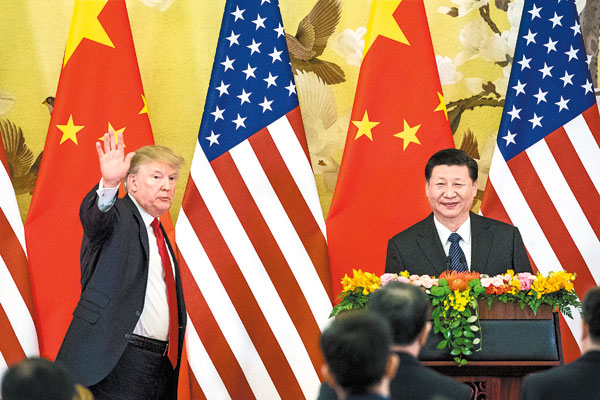China is not a strategic competitor to US


Like the US National Security Strategy report issued in December, the 2018 US National Defense Strategy report published recently also identifies China as a strategic competitor, causing repercussions in international relations and evoking a fierce rebuttal from China.
Senior Colonel Ren Guoqiang, spokesman for the Defense Ministry, has said the United States should abandon the Cold War mentality and view China's defense and military modernization rationally and objectively. Reiterating that Beijing will unswervingly follow the path of peaceful development and a defensive defense policy, Ren called on Washington to fulfill the important agreements reached by the top leaders of China and the US, and make concerted efforts to stabilize bilateral ties.
Ren's statement makes clear the attitudes of the People's Liberation Army and the Chinese government. First, China will never seek hegemony, and the PLA and the Chinese government have consistently played the role of builders and facilitators of world peace and development, and made efforts to improve the world order. They have shouldered more than their share of international responsibilities, winning the praise of the international community.
In the 40 years since the launch of reform and opening-up in 1978, China has demonstrated it has no intention of seeking hegemony, which has convinced the international community. But the US has persistently ignored and twisted this fact, in order to ratchet up tensions.
This has been overtly evident in the South China Sea issue. China has the sovereign right to conduct peaceful construction activities and build necessary defense facilities on its islands and reefs in the South China Sea. But despite the easing of tensions in the South China Sea, the US has chosen to flex its muscles in the region and stir up trouble in the name of "freedom of navigation", by sending vessels to illegally navigate the waters near China's islands and reefs. It seems the US is not interested in seeing a peaceful and stable South China Sea.
Second, China has upheld and will always uphold the principle of non-confrontation. Chinese Foreign Minister Wang Yi elaborated on the concept of "new type of major-country relationship", that is, non-conflict, non-confrontation, mutual respect and win-win cooperation in a speech at Washington-based think tank Brookings Institution in 2013. The nonconfrontation principle not only reflects the general attitude and good intentions of China, but also suggests how the US can constructively manage Sino-US relations. Non-confrontation conforms to the interests of both countries and the world beyond. So we hope the US acts wisely and makes efforts to improve people's well-being in both countries.
Let us return to the essential question: Whether China is a strategic competitor to the US?
The answer is an emphatic no. China has no intention of becoming a strategic competitor to any country, let alone the US. Nor has it taken any actions to do so. Nonetheless, the US National Security Strategy and 2018 National Defense Strategy reports label China as one, making a serious strategic misjudgment.
About 2,000 years ago, Chinese military strategist Sun Tzu warned: "The art of war is of vital importance to the state. It is a matter of life and death, a road either to safety or to ruin. Hence, it is a subject of inquiry which can on no account be neglected."
Today, the global trend is one of peace and development. If the political and military elites of one country cannot objectively analyze and judge this international relations trend and, instead, devise foreign policies at will, their country will take the wrong diplomatic path to the detriment of public well-being. We hope US political and military elites treat Sino-US ties more prudently and facilitate the healthy development of bilateral relations, which would benefit peoples in both countries and the world beyond.
The author is an associate professor at the PLA Navy's Dalian Warship College.


































